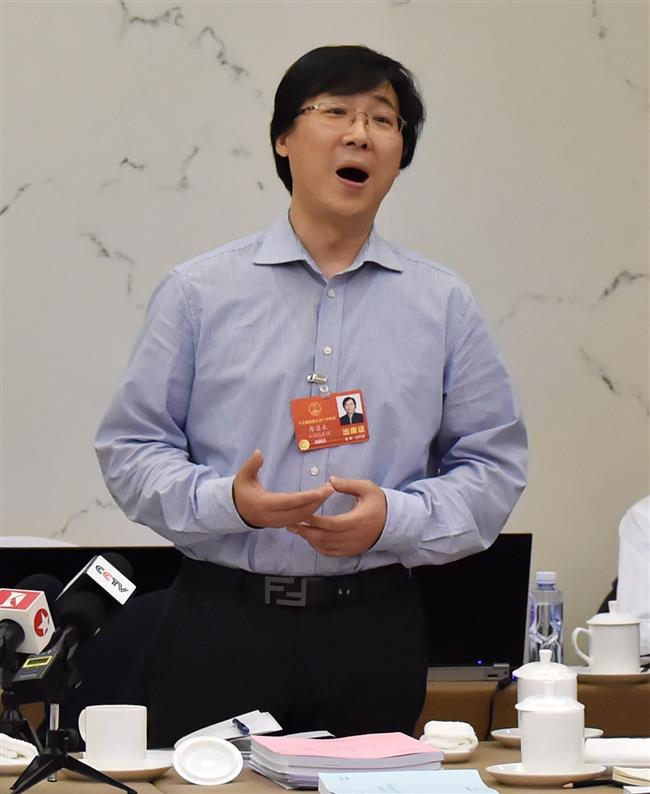
Liao Changyong sings for Shanghai women deputies on International Women’s Day on March 8.
Liao Changyong, a world-renowned baritone who sits as a deputy in the National People’s Congress, is singing from the same page as the Party faithful in seeking to promote Chinese culture across the world.
“China is now approaching the center of the world stage,” said Liao, who is also the deputy head of the Shanghai Conservatory of Music.
This year during the sessions of the congress and its consultative body, Liao called for the creation of more literary and art works that reflect the national spirit of a new era in China.
“An increasing number of television programs featuring national culture are emerging, with rising viewership,” he said, citing examples like “National Treasure,” which tells the stories of ancient relics, and “Letters in China,” which airs historic letters and gives their backgrounds.
“Literature, arts and entertainment should embrace social responsibility and promote positive energy rather than just catching people’s eyes,” he said. “Those of us in the literary and art world should not merely pander to the tastes of audiences but rather play a role of guiding them, especially our youth.”
Reared in a poor village in Sichuan Province, Liao loved to sing from an early age. Walking to school every day, he would entertain other village kids with songs.
Before embarking on a career of music, Liao was an athlete who won prizes in track and field at school.
At a school Chinese New Year party, where every class was supposed to give one performance, Liao agreed to sing when none of his other classmates raised their hands to volunteer to perform. During the party show, his singing was so riveting that he later represented his county in a singing contest and won the top prize.
Liao subsequently was accepted at the Sichuan Province Song and Dance Theater, and later he enrolled in the Shanghai Conservatory of Music.
"Compared with urban students, I came to music without training or background in studies such as music theory," Liao said. “I had even never seen a piano before."
However, his instructor in Shanghai, seeing the talent in the young man, was patient in nurturing. Liao responded by working very hard.
"I almost never left Shanghai in the first three years of college, not even a single trip," he said.
In 1997, Liao hit the big time by winning the famed Placido Domingo Operalia prize. That opened a door for him to use his musical talent to promote Chinese culture on overseas engagements.
In addition to music, Liao said he loves traditional Chinese literature, which is often incorporated into lyrics he sings.
“At school, I was good at history and ancient Chinese poems and prose,” Liao said. “So, when I sing the ancient poems, the rhythm always strikes a responsive chord in my heart.”
During his eight years at the Shanghai Conservatory of Music, his instructors drummed home the idea that it was as important to take Chinese music abroad as it was to bring Western music to China. Nearly all Liao’s concerts feature some Chinese pieces.
“The magic of music is amazing,” he said. “This magic can break barrier of language.”
He recalls once watching a performance by the legendary soprano Maria Callas on television when he was in high school.
“Although I could not understand a word she sang,” Liao said, “I was caught up by her soul and expression, and that made me feel that I understood everything.”
Liao is well received overseas. After winning the Domingo prize, he toured several cities in Norway, with Chinese songs on the concert bills. He was surprised that audiences warmed to them so quickly.
“They thought it was so nice to hear Chinese songs,” Liao said. “The power of music truly has no borders.”
In January, Liao and a Chinese opera troupe consisted of mainly students from the conservatory took the opera Tang Xianzu, named after one of the greatest playwright in Chinese history, to Europe. Performances were held in the Czech Republic and Hungary.
When the performers, dressed in costumes of the traditional Kunqu Opera, appeared on the stage, Liao told Shanghai Daily, the audience went “mad,” feverishly snapping photos with cell phones.
“We were very proud,” Liao said. “We used some traditional Chinese ways of singing, and the orchestra included folk musical instruments like the erhu (a two-stringed, bowed instrument) and pipa (a four-stringed instrument).”
He added, "The Czech Republic has a history of great composers, like Smetana and Dvorak, and the same in true of Hungary. They have something we can learn from in promoting our own national music and culture.”
Liao said the opera troupe is working on the “Trilogy of Shanghai” series, incorporating a well-known film, play and literary piece from Shanghai into operas. The first is based on The River of Spring, a 1947 film set against the backdrop of war. It has already gone into production. The second is Sunrise, a drama by playwright Cao Yu, which is still in the works. The third is The Family, written by literary giant Ba Jin.
Sunrise was chosen as a vehicle to reflect the true state of society during the Republic of China (1912-1949) period, Liao said.
“Many TV dramas show us the glamorous side of the Republic of China period, but it truly has some darker sides, where those at the bottom of society were suffering,” he said. “We want to present the truth.”
